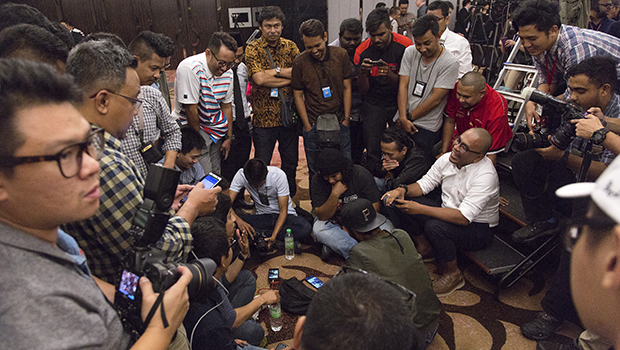Early one morning in February 2014, Malaysiakini journalists arrived at the Kuala Lumpur headquarters of the independent news site to find walls splashed with red paint and a suspicious box.
Delivered anonymously in the dead of night, the box contained the photo of an opposition politician recently charged with sedition over a satirical video clip posted online; a bag of rice and needles; plus a live duck in a shocked condition.
“We were told it had something to do with black magic,” said Kuang Keng Kuek Ser, now a freelance data journalist, of perhaps the weirdest threat received by Malaysiakini. (They later adopted the duck to show they wouldn’t be intimidated, he said.)
The news site, ICIJ’s partner in the country, like other independent media outlets, faced retaliation repeatedly for publishing articles critical of former Prime Minister Najib Razak and his party.
Other Malaysian journalists who spoke to ICIJ described how Najib’s government had arbitrarily suspended licenses to non-partisan media sites, routinely censored critical content (including comments posted by their readers), detained journalists for seeking comments from police and subjected reporters to surveillance.
This was the reality for journalists in Malaysia until the night of May 9 this year, when the surprise poll defeat of Najib by Opposition leader Mahathir Mohamad changed the media landscape dramatically.
Kita telah melakukan sesuatu yang selama ini mustahil untuk berlaku. Angin perubahan telah melanda. Semalam, kita telah memilih untuk mengembalikan maruah negara. Terima kasih kami ucapkan. Kami akan menunaikan janji-janji yang telah dibuat dan bersedia berhadapan dengan rakyat. pic.twitter.com/TGokIw7655
— Dr Mahathir Mohamad (@chedetofficial) May 10, 2018
Referred to by cartoonist Zulkiflee Anwar Ulhaque as Malaysia’s “Man of Steal,” Najib lost to his former mentor Mahathir after the strongman came out of retirement, aged 92, and defected to the opposition. Najib’s ousting by the world’s oldest elected leader cost his party rule for the first time since the country became independent in 1957.
Khairil Yusof, a data transparency advocate who also trains and collaborates with newsrooms, said the transformation had been seismic: “The media changed the moment the results started coming in, after 11 pm.”
It’s not propaganda anymore, it’s actually reporters providing hour by hour updates.
Yusof was monitoring the internet for censorship that night and noticed the Malaysiakini website had been temporarily blacked out. But other sites were live streaming the results, that surprised many.
“It was an amazing time in Malaysia,” Yusof said. All of a sudden, he said, journalists could report “freely” on what was actually going on.
“Now Malaysians can watch their TV again,” said Yusof, speaking from Kuala Lumpur as TV was broadcasting images of police raiding Najib’s home. “It’s not propaganda anymore, it’s actually reporters providing hour by hour updates.”
In the last few years of his almost decade-long tenure, Najib’s government was hit by a complex corruption scandal that triggered asset seizures and investigations in at least eight countries. According to the U.S. Justice Department, about $4.5 billion was stolen from the country’s sovereign wealth fund, 1Malaysia Development Berhad (1MDB), by high-level officials.
Najib, who set up the fund in 2009, has denied all allegations of wrongdoing. But, since the scandal broke in 2015, the few journalists who kept investigating the scandal suffered the consequences of his repressive government.
“Till then the online media had been relatively free by comparison [with newspapers and broadcasters],” said Clare Rewcastle-Brown, a Malaysia-born investigative journalist who runs The Sarawak Report news site. “As a result, most of the country had switched to that medium to get reliable information and Najib ‘realized’ he needed to take measures to bring it under control.”
On April 30, 2015, the Malaysian police arrested the top executives of two local media outlets, The Edge Media Group and The Malaysian Insider, on charges of sedition, after they revealed links between Najib’s allies and 1MDB. They were later released, but the Edge’s publication license was suspended for three months.
In July that year, the Sarawak Report was blocked after exposing a multimillion dollar deposit to Najib’s personal account. The police issued an arrest warrant against Rewcastle-Brown and applied to Interpol to have her extradited from the United Kingdom, where she was living.
Rewcastle-Brown said she’d been treated as “an enemy of the state” and had suffered cyber attacks, false news accusations and surveillance.

But after the new prime minister was sworn in last month, she finally felt vindicated, she said. The warrant was lifted and her website was unblocked. On her return to Kuala Lumpur, strangers took selfies with her. One of the largest newspapers in the country ran a long article with a picture of her on the front page, and an online piece titled “No Changes Without Brave Individuals.”
For others, too, that front page was a symbol of change.
“It’s stunning,” said May Yee Chen, a Malaysian freelance journalist who has seen the media landscape change radically in the past two decades. “Since the election, it’s been night and day.”
Reporters in Malaysia can now cover issues that were considered taboo, from corruption to religion to the many business interests that influence politics.
But they are calling on the new government to repeal the many draconian laws that could still be used to punish the free press.
“It’s the biggest opportunity to wipe the slate clean and fix all the wrongs,” Chen said. “It’s a very heady time for Malaysian journalism.”
Correction: An earlier version of this article misstated the number of years Najib spent as prime minister. He was in power for almost one decade (2009-2018), not two decades.
